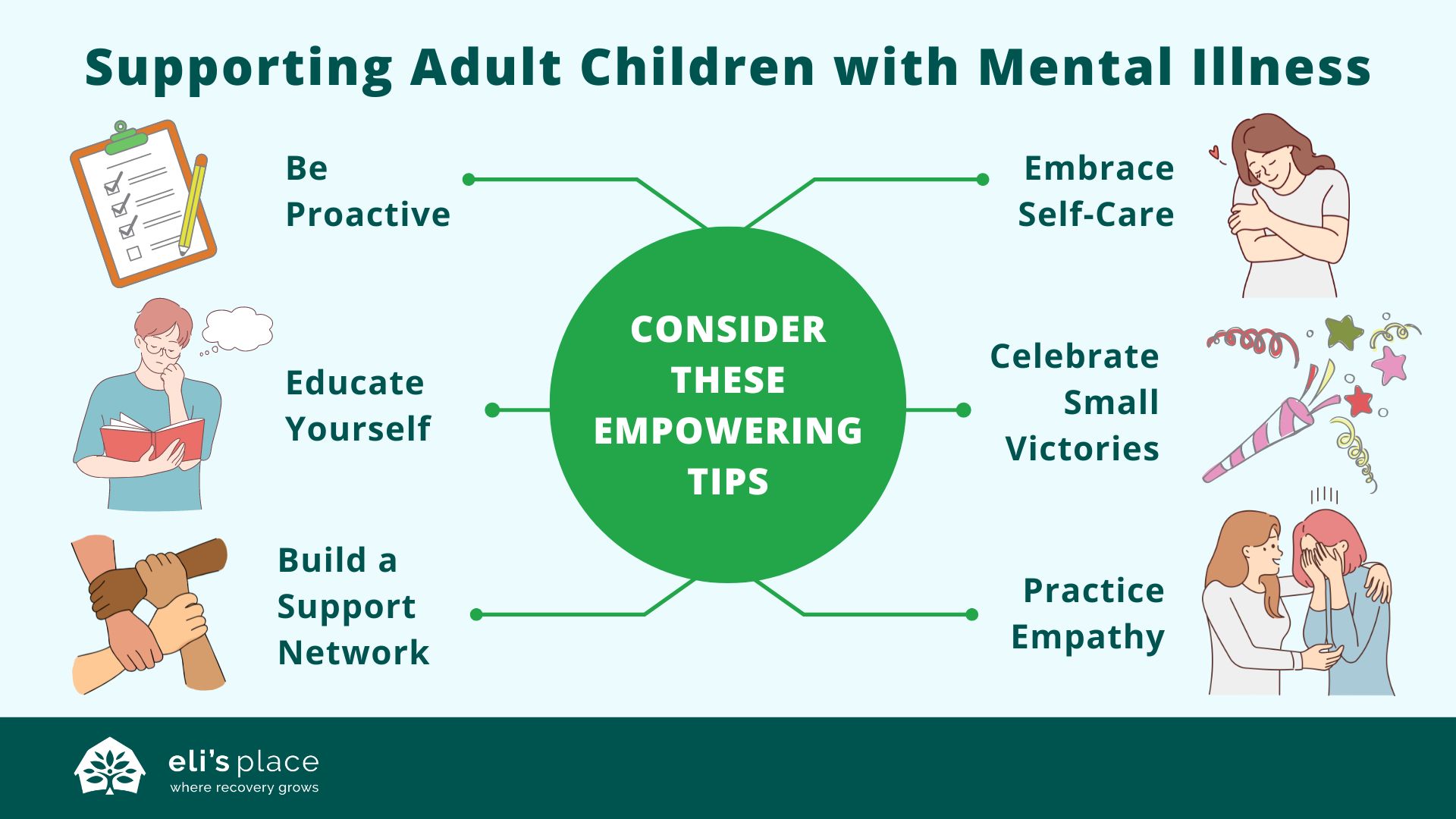The journey of supporting adult children with mental illness is often intertwined with challenges, uncertainties, and moments of profound strength. In the midst of this, families serve as pillars of support, advocates, and sources of unwavering love.

A Beacon of Light in the Darkness
Navigating the intricacies of mental illness within the context of family dynamics can be overwhelming. However, amidst the complexities, simple gestures and advice can serve as beacons of light. Sometimes, the most powerful tool is merely being present, offering a listening ear, and providing unconditional love. Encouraging open communication channels, without judgment, fosters a safe environment. Adult children who feel safe are more likely to express their struggles and seek help when needed.

When Anosognosia is Involved: Understanding the Complexities
Anosognosia, a condition where individuals lack insight into their illness, further complicates the landscape. In such cases, persuading adult children to seek treatment can feel like an impossible challenge. It’s essential to approach this with empathy and patience, understanding that resistance often stems from fear and internalized stigma. Gentle encouragement, coupled with education about the benefits of treatment, can gradually chip away at the barriers erected by anosognosia.

More Complex Legal Issues: Balancing Privacy and Right to Refuse Treatment
The intersection of mental illness and legal considerations adds another layer of complexity. Privacy laws and an individual’s right to refuse treatment must be delicately balanced with the need for intervention to ensure their well-being. Navigating these legal waters requires a nuanced understanding of relevant statutes. It is always best to seek guidance from legal professionals specializing in mental health law. It’s a challenging terrain where compassion and advocacy must go hand in hand.
For deeper context, read these stories from Blue Door and The Globe and Mail for practical insights.

Families ARE Important in Recovery: The Power of Unconditional Support
Amidst the turmoil, families play an indispensable role in the recovery journey. Their unwavering support, encouragement, and advocacy serve as lifelines for adult children grappling with mental illness. By fostering a nurturing and understanding environment, families can instill hope and resilience, creating a space to empower loved ones to navigate their darkest days with courage and determination.

Organizations Challenging Current Laws to Support Adult Children with Mental Illness: Advocacy in Action
Across the globe, organizations are spearheading initiatives to challenge existing laws and policies that hinder the support and treatment of adult children with mental illness. Through advocacy efforts, these organizations strive to amplify the voices of families and advocate for legislative reforms that prioritize mental health and well-being. By lobbying for greater access to treatment, improved support services, and enhanced legal protections, they pave the way for a more inclusive and compassionate society.
For example, Reform Mental Health is advocating for improvements for people living with serious, debilitating mental disorders in Ontario. They focus on individuals who live with psychosis, specifically schizophrenia. Its mandate is that all citizens deserve the best practices for assessment, treatment and rehabilitation, with families included in all stages of care.

Where to Find Support: Building Communities of Care
For families embarking on the journey of supporting adult children with mental illness, finding support is paramount. Local and national organizations offer a myriad of resources tailored to meet the diverse needs of caregivers. From support groups and helplines to online forums and educational workshops, these avenues provide invaluable guidance, solace, and solidarity. By connecting with fellow caregivers and accessing the wealth of knowledge and support available, families can navigate the challenges with renewed strength and resilience.
Check out this thorough list of options for Ontarians from the Canadian Mental Health Association.
Supporting adult children with mental illness is a journey fraught with challenges, but one that is also imbued with moments of profound connection, growth, and resilience. Let us recognize the vital role families play in nurturing hope and healing. Through unwavering love, advocacy, and community support, we can light the path toward a brighter future for all those affected by mental illness.

In addition to the insights shared, consider these empowering tips:
- Embrace Self-Care: Amidst the demands of caregiving, it’s essential for family members to prioritize their own well-being. Carve out moments for self-care, whether it’s through meditation, hobbies, or simply taking a walk in nature. By nurturing your own mental and emotional health, you’ll be better equipped to support your adult child with compassion and strength. In addition to helping yourself, you will model healthy behaviour.
- Educate Yourself: Knowledge is a powerful tool in navigating the intricacies of mental illness. Take the time to educate yourself about your adult child’s condition, treatment options, and available support services. Consult with professionals available to you. Empower yourself with information so you can make informed decisions and advocate effectively on behalf of your loved one.
- Practice Empathy: Cultivate empathy in your interactions with your adult child. Seek to understand their experiences, challenges, and emotions without judgment. By fostering a sense of empathy and understanding, you create a safe and supportive environment where your loved one feels valued and respected.
- Be Proactive: Anticipate potential barriers and strategize solutions that will work for you and your family.
- Celebrate Small Victories: Recovery from mental illness is a journey marked by small victories and milestones. Take the time to celebrate each achievement. Whether it’s attending a therapy session or making progress in daily tasks, acknowledge and celebrate the resilience and courage of your adult child.
- Build a Support Network: Surround yourself with a supportive network of friends, family members, and fellow caregivers who understand and empathize with your journey. Share your experiences, seek guidance, and draw strength from the collective wisdom and support of your community.
Eli’s Place will be a rural, residential treatment program for young adults with serious mental illness. To learn more about our mission and our proven-effective model click here.




